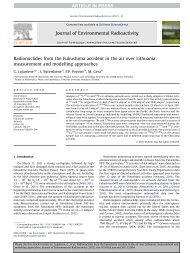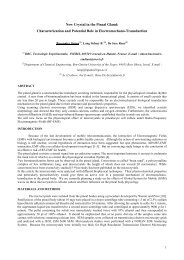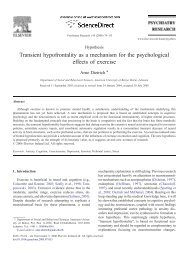Psychology of Terrorism - National Criminal Justice Reference Service
Psychology of Terrorism - National Criminal Justice Reference Service
Psychology of Terrorism - National Criminal Justice Reference Service
Create successful ePaper yourself
Turn your PDF publications into a flip-book with our unique Google optimized e-Paper software.
<strong>Reference</strong> List1. Root causes <strong>of</strong> terrorism. International expert meeting in Olso Olso: Norwegian Institute <strong>of</strong> InternationalAffairs.Call Number: Key Quote Summary: An international panel <strong>of</strong> leading experts on terrorism met inOslo to discuss root causes <strong>of</strong> terrorism. The main purpose was to provide inputs from the researchcommunity to a high-level conference on “Fighting <strong>Terrorism</strong> for Humanity” to be held in NewYork on 22 September 2003. The findings described below are conclusions drawn by the chairmanon the basis <strong>of</strong> presentations and discussions.-A main accomplishment <strong>of</strong> the expert panel was to invalidate several widely held ideas about whatcauses terrorism. There was broad agreement that there is only a weak and indirect relationshipbetween poverty and terrorism. At the individual level, terrorists are generally not drawn from thepoorest segments <strong>of</strong> their societies. Typically, they are at average or over-average levels in terms <strong>of</strong>education and socio-economic background. Poor people are more likely to take part in simpler forms<strong>of</strong> political violence than terrorism, such as riots. The level <strong>of</strong> terrorism is not particularly high in thepoorest countries <strong>of</strong> the world. <strong>Terrorism</strong> is more commonly associated with countries with amedium level <strong>of</strong> economic development, <strong>of</strong>ten emerging in societies characterized by rapidmodernization and transition. On the other hand, poverty has frequently been used as justification forsocial revolutionary terrorists, who may claim to represent the poor and marginalized without beingpoor themselves. Although not a root cause <strong>of</strong> terrorism, poverty is a social evil that should befought for its own reasons.- State sponsorship is not a root cause <strong>of</strong> terrorism. Used as an instrument in their foreign policies,some states have capitalized on pre-existing terrorist groups rather than creating them. Terroristgroups have <strong>of</strong>ten been the initiators <strong>of</strong> these relationships, at times courting several potential statesponsors in order to enhance their own independence. State sponsorship is clearly an enabling factor<strong>of</strong> terrorism, giving terrorist groups a far greater capacity and lethality than they would have had ontheir own. States have exercised varying degrees <strong>of</strong> control over the groups they have sponsored,ranging from using terrorists as “guns for hire” to having virtually no influence at all over theiroperations. Tight state control is rare. Also Western democratic governments have occasionallysupported terrorist organizations as a foreign policy means.- Suicide terrorism is not caused by religion (or more specifically Islam) as such. Many suicideterrorists around the world are secular, or belong to other religions than Islam. Suicide terrorists aremotivated mainly by political goals usually to end foreign occupation or domestic domination by adifferent ethnic group. Their “martyrdom” is, however, frequently legitimized and glorified withreference to religious ideas and values.- Terrorists are not insane or irrational actors. Symptoms <strong>of</strong> psychopathology are not commonamong terrorists. Neither do suicide terrorists, as individuals, possess the typical risk factors <strong>of</strong>suicide. There is no common personality pr<strong>of</strong>ile that characterizes most terrorists, who appear to berelatively normal individuals. Terrorists may follow their own rationalities based on extremistideologies or particular terrorist logics, but they are not irrational.-What causes terrorism? The notion <strong>of</strong> terrorism is applied to a great diversity <strong>of</strong> groups withdifferent origins and goals. <strong>Terrorism</strong> occurs in wealthy countries as well as in poor countries, indemocracies as well as in authoritarian states. Thus, there exists no single root cause <strong>of</strong> terrorism, oreven a common set <strong>of</strong> causes. There are, however, a number <strong>of</strong> preconditions and precipitants for theemergence <strong>of</strong> various forms <strong>of</strong> terrorism.One limitation <strong>of</strong> the “root cause” approach is the underlying idea that terrorists are just passivepawns <strong>of</strong> the social, economic and psychological forces around them doing what these “causes”compel them to do. It is more useful to see terrorists as rational and intentional actors who developdeliberate strategies to achieve political objectives. They make their choices between differentoptions and tactics, on the basis <strong>of</strong> the limitations and possibilities <strong>of</strong> the situation. <strong>Terrorism</strong> isbetter understood as emerging from a process <strong>of</strong> interaction between different parties, than as amechanical cause-and-effect relationship.-With these reservations in mind, it is nevertheless useful to try to identify some conditions andcircumstances that give rise to terrorism, or that at least provide a fertile ground for radical groupswanting to use terrorist methods to achieve their objectives. One can distinguish betweenpreconditions and precipitants as two ends <strong>of</strong> a continuum.














